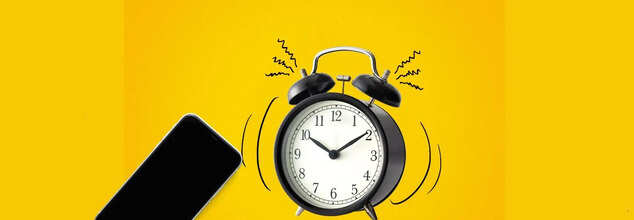
Credit: Canva
Why Setting Alarms On Phone Is A Bad Idea?
Mobile phones, for many of us, have minimised the clutter. Now you do not need a calculator, a walkman, a map or an alarm clock, you have all of these things clubbed in one simple gadget—your smart phone.
However, there is a growing consensus that switching back to the traditional analogue alarm clocks could prove to be a game changer when it comes to sleep and waking up afresh. To start with, neurologists and sleep experts have continuously warned about the negative impact of doomscrolling on sleep. Keeping your phone in another room at night can help eliminate distractions and reduce the tendency to procrastinate at bedtime. With a phone on your bedside table, it’s tempting to scroll through social media before bed and hit the snooze button repeatedly in the morning.
Downside Of Snooze Button
Our sleep is divided into four phases. The first three are the NREMs (Non-Rapid Eye Moment) phases and the fourth is REM. Every individual experiences all these cycles every night and if they have slept well, and completed all these phases without any hindrance, then they should wake up feeling well-rested. This makes the snooze button unnecessary. While hitting snooze once might provide a psychological cushion, excessive use disrupts sleep cycles and prevents truly restorative rest.
Dr Brandon Peters-Mathews, a neurologist and sleep medicine physician, speaking with a leading media organization, said that the snooze button interrupts the 4 phases sleep cycle. Fragmenting this sleep with frequent alarms can impair cognitive function. Experts advise that instead of setting an alarm early and snoozing multiple times, people should allow themselves to sleep until they absolutely need to wake up."Get out of bed as soon as the alarm rings, rather than lingering for extra minutes that add little value to your rest," Dr. Joseph Dzierzewski, senior vice president of research at the National Sleep Foundation said.
How Your Phone Disrupts Sleep
Beyond the snooze button, keeping a phone within reach can interfere with a healthy nighttime routine. An ideal bedtime ritual involves unwinding and transitioning from an active state to a relaxed one. Having a phone nearby could easily tempt you to start scrolling, exposing you to stimulating content and blue light, which can delay sleep onset. "Having a phone in close proximity can increase curiosity—wondering what notifications you’ve missed," says Dzierzewski. This temptation can easily extend wakefulness, cutting into much-needed sleep. Even if you aim for eight hours of rest, late-night scrolling can quickly reduce that window.
How to Wake Up Feeling Rested
The key to waking up earlier and more refreshed is ensuring good-quality sleep. The National Sleep Foundation recommends seven to nine hours per night for adults, yet research shows that 60% of adults fail to meet this target.
To improve sleep, experts suggest adopting healthy habits:
- Exposure to bright light during the day
- Regular physical activity (at least 30 minutes, five days a week)
- Consistent meal times
- Avoiding caffeine, alcohol, and heavy meals before bed
- Establishing a relaxing wind-down routine
- Sleeping in a dark, cool, and quiet environment
- Putting away electronic devices at least an hour before bedtime
© 2024 Bennett, Coleman & Company Limited

